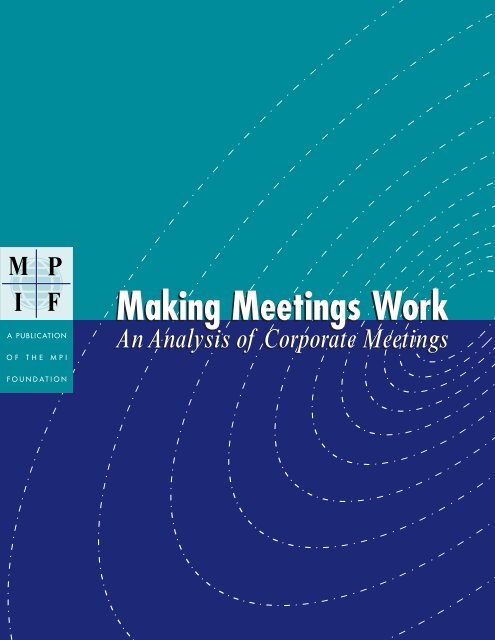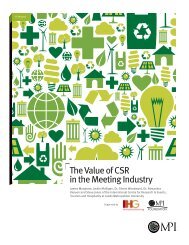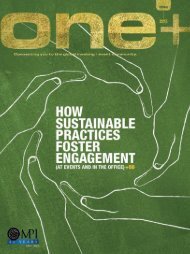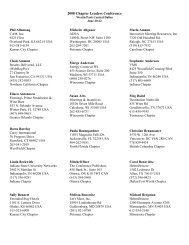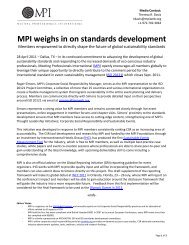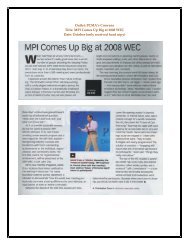1-white paper - Meeting Professionals International
1-white paper - Meeting Professionals International
1-white paper - Meeting Professionals International
You also want an ePaper? Increase the reach of your titles
YUMPU automatically turns print PDFs into web optimized ePapers that Google loves.
A PUBLICATION<br />
OF THE MPI<br />
FOUNDATION<br />
Making <strong>Meeting</strong>s Work<br />
An Analysis of Corporate <strong>Meeting</strong>s
Scientifically rigorous data<br />
about what happens in a corporate meeting room is<br />
rare. Too often we rely on our impressions, whether as<br />
planners, as attendees or as senior managers. Even our<br />
evaluation tools—usually on-the-spot surveys or postmeeting<br />
wrap-up sessions with the planning team—<br />
seem woefully inadequate at times. The information<br />
seems too “soft” when we must persuade senior management<br />
to make hard changes or increase budget dollars<br />
to improve the outcome of future meetings.<br />
The absence of such data was one reason the<br />
Foundation of <strong>Meeting</strong> <strong>Professionals</strong> <strong>International</strong><br />
embarked on a nationwide research project which—<br />
through focus groups, case studies, fax questionnaires<br />
and telephone interviews—identified key success drivers<br />
to sales meetings, management meetings and education/training<br />
meetings in the corporate environment. We<br />
didn’t just talk to planners. We focused primarily on<br />
senior managers who fund meetings and those who<br />
attend them, the ultimate stakeholders. By using rigorous<br />
scientific sampling and surveying techniques, the<br />
MPI Foundation has created a true-to-life snapshot of<br />
the state of the corporate meeting in America. More<br />
importantly, the study—nicknamed a “gap analysis”—<br />
created a statistical instrument to measure the at times<br />
great distance between these stakeholders’ expectations<br />
of a meeting’s outcome and the reality delivered by a<br />
planner.<br />
Certainly it is not all bad news. Corporate meeting planners<br />
do many things well. This first MPI Foundation<br />
<strong>paper</strong> identifies both successes and failings while<br />
providing some tips on how to fill in the gaps mapped<br />
in the study. The MPI Foundation is currently reviewing<br />
plans for similar studies of association meetings and<br />
international meetings.<br />
As a research and development organization dedicated to<br />
the meeting industry, the MPI Foundation will continue<br />
to identify needs through such studies as this and funding<br />
programs and projects that fulfill them. We will help<br />
you ensure that the objectives you set in the meeting<br />
room are met in the wider organization outside.<br />
Weldon D. Webb<br />
Chairman, MPI Foundation<br />
May 1998
Making <strong>Meeting</strong>s Work<br />
An Analysis of Corporate <strong>Meeting</strong>s<br />
Copyright © 1998 MPI Foundation<br />
All rights reserved. No portion of this work may be<br />
reproduced or transmitted in any form or by any<br />
means, electronic or mechanical, without permission in<br />
writing from the MPI Foundation, the publisher. Printed<br />
in the United States.
2<br />
Purpose<br />
This <strong>paper</strong> examines the effectiveness of<br />
corporate meetings from the perspective of (1)<br />
senior managers responsible for budgeting and<br />
sponsoring meetings, (2) meeting attendees, and<br />
(3) professional meeting planners. <strong>Meeting</strong><br />
effectiveness was examined from three<br />
perspectives: organizational outcomes, personal<br />
outcomes, and the meeting process.<br />
The study upon which this <strong>paper</strong> is based<br />
examined sales conferences, management<br />
meetings, and education/training meetings.To<br />
qualify for the study, meetings had to involve<br />
significant planning and spending and be<br />
attended by 20 or more people. Process<br />
The study was conducted in two phases. Phase I<br />
consisted of two corporate case studies and a<br />
series of focus groups in New York, Chicago, and<br />
Los Angeles. Key findings from these case<br />
studies and focus groups determined the<br />
questions used in the second phase. Phase II<br />
consisted of telephone or fax interviews with<br />
160 senior managers, 420 meeting attendees,<br />
and 94 meeting planners.
Findings<br />
1. Senior Management <strong>Meeting</strong><br />
Sponsors<br />
An overwhelming majority of managers (85%) think<br />
their meetings are successful and produce a somewhat<br />
or much higher return on investment (ROI) than other<br />
investments. Some managers measure success by quantitative<br />
measures (e.g., ROI, sales leads), while others<br />
focus on qualitative measures (e.g., interaction, appropriate<br />
speakers, clear purpose/mission).<br />
Managers are quite pleased with the meeting process,<br />
the knowledge and skills of meeting professionals, the<br />
timing and pacing of meetings, and the selection of quality<br />
facilities. <strong>Meeting</strong> planners are obviously attuned to<br />
the expectations of those to whom they report.<br />
Rank Order of Managers’ <strong>Meeting</strong><br />
Satisfaction with Areas of Needed<br />
Improvements<br />
Leave with<br />
concrete plans<br />
Take away<br />
important messages<br />
More committed<br />
to the organization<br />
Leave motivated<br />
and inspired<br />
More productive<br />
from learning<br />
54<br />
In terms of meeting outcomes, managers think meetings<br />
are most successful in conveying a clear sense of organizational<br />
priorities and strengthening the organizational<br />
culture. Managers are less convinced that attendees<br />
leave with concrete plans, take away important messages,<br />
develop a greater commitment to the organiza-<br />
63<br />
62<br />
68<br />
74<br />
77<br />
80<br />
79<br />
80<br />
83<br />
% Who<br />
Consider<br />
<strong>Meeting</strong>s<br />
Successful<br />
% Who<br />
Consider<br />
Improvements<br />
Needed<br />
40 60 80 100<br />
tion and leave motivated and inspired to be more<br />
productive.<br />
Managers are most concerned that the impact of meetings<br />
seems to diminish quickly once attendees are back<br />
in their work environments. Why this occurs may be<br />
related to the expectations of what can be accomplished<br />
with the agenda, the content, the delivery, and the pace<br />
of the meeting. Managers may lack understanding of<br />
how to change the workplace behavior of attendees.<br />
Most managers think that the dissemination of information<br />
is sufficient for bringing about change. Behavioral<br />
change, however, is difficult and<br />
generally requires time for attendees Learner Overload<br />
to process and internalize the content.<br />
Attendees indicate agendas are “Attendees have limited capacities in their<br />
often too ambitious. “It’s a brain<br />
drain. . . there’s only so much that working memory, the same as your<br />
you could gather out of it before you<br />
have to relax,” stated one attendee. computer. Once they are overloaded,<br />
2. <strong>Meeting</strong> Attendees<br />
Most attendees are largely satisfied<br />
with the outcomes of the meetings<br />
they attend (70%), with an even<br />
larger number being satisfied with<br />
meeting organization and management<br />
(85%). This indicates that<br />
meeting planners have achieved a<br />
high level of competence in securing<br />
good learning environments.<br />
Attendees are more satisfied with sales and education<br />
meetings than with management meetings. They think<br />
sales and education meetings are better investments<br />
than management meetings.<br />
Attendees judge the success of meetings somewhat differently<br />
from senior managers. Attendees place greater<br />
emphasis on what transpires within the meeting in contrast<br />
to senior managers who are more concerned about<br />
frustration and demoralization inevitably<br />
set in which blocks further learning. One<br />
key to teaching is to avoid overloading<br />
one’s working memory.”<br />
Ruth C. Clark, Author<br />
3
4<br />
Need for<br />
Frequent<br />
Breaks<br />
People learn the most<br />
by taking frequent<br />
breaks. They<br />
remember the<br />
content learned first<br />
and last. More<br />
frequent breaks<br />
mean more firsts and<br />
lasts. Breaks are a<br />
time to consolidate<br />
what has been<br />
learned and an<br />
opportunity to<br />
revitalize brain cells<br />
for the next session.<br />
the outcomes of meetings. Below is a comparison of the<br />
top success factors as seen by senior managers and<br />
attendees.<br />
Key <strong>Meeting</strong> Success Factors<br />
of Senior Managers<br />
1. Clear sense of organizational priorities.<br />
2. Concrete action plans.<br />
3. Improved interaction.<br />
4. Important messages are remembered.<br />
5. Greater productivity from learning.<br />
6. Improved motivation and inspiration.<br />
7. Greater commitment to the organization.<br />
Of the three types of meetings studied—sales, management,<br />
and education/training—attendees’ expectations<br />
are more in line with those of senior managers on management<br />
meetings. Attendees are most interested in the<br />
appropriate attendees coming and working well together.<br />
Attendees at sales meetings place greater emphasis on<br />
the meeting location and environment, program scheduling,<br />
and keeping on schedule. Having a reasonable<br />
schedule was indicated by attendees as an area that<br />
needs improvement. Attendees commented, “Allow frequent<br />
breaks,” “Do not drag too far into the afternoon,”<br />
and “Use evening activities to blow off steam.”<br />
Those who attend education and training meetings view<br />
speakers, materials, topics and follow-up as key success<br />
factors. They place less emphasis on location and environment<br />
and who attends.<br />
While many differences exist in the success factors identified<br />
for sales, management and education meetings, all<br />
meeting types exhibited three consistent needs to varying<br />
degrees (see chart): 1) the schedule should be paced to<br />
maintain high energy; 2) speakers need to do a better<br />
job holding the attention of attendees; and 3) creative<br />
teaching and communication skills must be used.<br />
Key <strong>Meeting</strong> Success Factors<br />
of Attendees<br />
1. Well prepared speakers.<br />
2. Agenda covered as promised.<br />
3. Equipment worked.<br />
4. Stayed on schedule.<br />
5. Sufficient materials.<br />
6. Attendees from appropriate departments came.<br />
7. Speakers held their attention.<br />
Attendees’ Rating of Needed<br />
Improvements Common to All Types of<br />
<strong>Meeting</strong>s<br />
80<br />
70<br />
60<br />
50<br />
100<br />
80<br />
60<br />
40<br />
100<br />
80<br />
60<br />
40<br />
Schedules<br />
paced for<br />
high energy<br />
Schedules<br />
paced for<br />
high energy<br />
Schedules<br />
paced for<br />
high energy<br />
Speakers<br />
held<br />
attention<br />
Speakers<br />
held<br />
attention<br />
Speakers<br />
held<br />
attention<br />
Creative<br />
teaching and<br />
comm. skills<br />
Creative<br />
teaching and<br />
comm. skills<br />
Creative<br />
teaching and<br />
comm. skills<br />
Ideal<br />
Actual<br />
Ideal<br />
Actual<br />
Ideal<br />
Actual<br />
Sales<br />
Management<br />
Education
There appears<br />
to be a close<br />
relationship<br />
between<br />
areas identified<br />
as needingimprovement<br />
by<br />
attendees and<br />
the failure of<br />
meetings to<br />
deliver the<br />
outcomes desired by senior managers. Attendees express<br />
a need to be engaged in learning that is challenging,<br />
stimulating, and led by effective speakers. “They did not<br />
do their homework before the meeting,” according to<br />
one attendee. Another commented, “The speakers they<br />
had were dreadful—they were not on our level at all.”<br />
Emotions—the basis for<br />
Inspiration and Motivation<br />
When content is presented in a stimulating<br />
and challenging manner it generates emotions<br />
within us as we try to make sense of what is<br />
occurring. Emotions are critical in determining<br />
whether we pay attention, learn, process, and<br />
retain information. We tend to remember best<br />
those experiences in which we had some emo-<br />
tional involvement and forget those in which<br />
we had little or no emotional involvement.<br />
Attendees will be as passive as a presenter<br />
allows them to be or will be as active as the<br />
presenter requires them to be, both of which<br />
impact learning.<br />
Attendees say they would be inspired and motivated and<br />
more committed to the organization if effective speakers<br />
were engaging and challenging.<br />
Overall, attendees have participated in a number of<br />
meetings and have developed rather high expectations<br />
of speakers and meeting outcomes. Therefore, their<br />
focus and concern on poor speakers is understood.<br />
Occasionally they encounter speakers at meetings who<br />
lack speaking experience and training in how to make<br />
effective presentations. These<br />
speakers have a limited repertoire<br />
of presentation skills,<br />
especially skills that involve<br />
the audience. Research shows<br />
that if learning is to occur, presentation<br />
skills are just as<br />
important as content.<br />
Speakers who lack the presentation<br />
skills identified in this<br />
study tend to use the lecture<br />
method. This form of presentation<br />
tends to (1) focus entirely<br />
on content, (2) overload<br />
attendees with information, and (3) minimize opportunities<br />
for attendees to process the message. More experienced<br />
speakers have learned to limit their content, focus<br />
on a few key points, and provide opportunities for attendees<br />
to process information through questions, discussion,<br />
problems, exercises, case studies, etc. Attendees<br />
make their own meaning of what they experience.<br />
Active mental processing by attendees converts information<br />
into knowledge. When faced with a great deal of<br />
information, attendees have to select what they will<br />
process and what they will discard—a natural sorting<br />
process the brain uses to prevent overload and keep a<br />
person functioning. Until information becomes knowledge<br />
to each attendee, it has no value to them and cannot<br />
be retrieved.<br />
5
6<br />
3. <strong>Meeting</strong> <strong>Professionals</strong><br />
<strong>Meeting</strong> professionals agree with attendees on what<br />
makes meetings successful. They differ in their perceptions,<br />
however, of whether meetings leave<br />
attendees inspired and motivated. <strong>Meeting</strong> professionals<br />
overwhelmingly think meetings accomplish<br />
this while attendees disagree. This is not surprising as<br />
meeting professionals are generally not concerned with<br />
how attendees perform after the meeting. Both groups<br />
think meetings build relationships among attendees and<br />
that management makes attendees feel valuable.<br />
Managers and meeting professionals agree on the importance<br />
of quality facilities. They both believe meeting professionals<br />
have the right skills and knowledge. They disagree<br />
somewhat on maintaining control over the timing,<br />
organization, and pacing of meetings. <strong>Meeting</strong> professionals<br />
feel managers do not do a good job in this area,<br />
while managers disagree.<br />
Managers’ View of the Role of <strong>Meeting</strong> <strong>Professionals</strong><br />
100<br />
80<br />
60<br />
40<br />
20<br />
0<br />
Facilities<br />
planning<br />
Evaluate<br />
success<br />
of meeting<br />
Work on<br />
agenda &<br />
organization<br />
Identify<br />
or work<br />
with speakers<br />
In-House Facilitator<br />
Outside Facilitator<br />
Work on<br />
materials and<br />
presentations<br />
While nearly all senior managers expect the planner on<br />
staff to handle facilities planning and help evaluate the<br />
meeting’s success, there is declining expectation that the<br />
planner will assist with meeting content and delivery<br />
(see chart). Managers did, however, favor the internal<br />
planner in expanded roles, over an outside contractor.<br />
<strong>Meeting</strong> professionals have considerable control over<br />
meeting facilities and arrangements and somewhat less<br />
control over areas that attendees think are very<br />
important—meeting content, organization,<br />
timing, and pacing. Senior managers appear to have<br />
the perception of a clearly defined, but limited role for<br />
meeting professionals. These managers, meanwhile,<br />
seem to take greater responsibility for meeting organization,<br />
content, and pacing and often take an active role in<br />
conducting the meeting. By limiting the role of meeting<br />
professionals and taking responsibility for the meeting<br />
content and process, senior managers may well be contributing<br />
to less than desired program outcomes.<br />
Conclusions<br />
Senior managers are quite pleased with meeting facilities<br />
and arrangements and think meetings are a good return<br />
on investment. Their major concerns for improvement are<br />
what happens with the attendees, especially after meetings—that<br />
they leave with concrete plans, take away<br />
important messages, be more productive, are motivated<br />
and inspired, and more committed to the organization.<br />
Attendees are more concerned about reasonable agendas<br />
and effective speakers which may be causes for their not<br />
feeling more inspired and motivated. The greatest<br />
needs for improvement relate to the planning and<br />
delivery of content that leaves attendees motivated<br />
and inspired. <strong>Meeting</strong> logistics and facilities appear<br />
to be adequate.
Little Reminders<br />
What can planners do? Managers say<br />
the impact of meetings on attendees<br />
quickly diminishes once attendees are back<br />
in their work environments.<br />
When I facilitate sessions, I provide toys<br />
that many tell me are kept on their desks<br />
to remind them of what they learned. If<br />
your company is taking a closer look at<br />
new products, positioning, etc., a<br />
magnifying glass will be a reminder of the<br />
meeting and reinforcement of ideas<br />
presented.<br />
Joan Eisenstodt, Independent Planner<br />
Based on the findings of this study, the following recommendations<br />
will make meetings more effective:<br />
1. <strong>Meeting</strong>s should be planned around clearly<br />
identified problems or issues with specific desired<br />
outcomes. These outcomes should dictate the form<br />
and process of meetings.<br />
2. <strong>Meeting</strong>s should be viewed as learning experiences<br />
designed to change the behavior of attendees.<br />
This means (1) set common expectations for everyone<br />
as to the purpose and desired outcomes of meetings,<br />
(2) realize that the meeting is but one part of<br />
the change process, and (3) understand that changes<br />
in behavior are more complex and require more than<br />
merely disseminating information.<br />
3. The agenda, pace of the meeting, amount of<br />
content, delivery methods, and degree of relevance<br />
are critical factors that must be carefully<br />
planned. How attendees integrate and use what they<br />
experience at meetings depends largely on what<br />
occurs during the meeting. The mere dissemination of<br />
content generally does not change one’s performance.<br />
The delivery methods and degree of attendee<br />
processing with the content are just as important as<br />
the content if learning and change are to occur<br />
according to cognitive psychologists.<br />
4. <strong>Meeting</strong> planners can play an instrumental role<br />
in addressing areas that need to be improved by 1)<br />
increasing their knowledge of how to institute change<br />
within an organization and the proper role of education;<br />
2) expanding their role beyond meeting logistics<br />
to include desired outcomes, selection of content and<br />
the use of appropriate methodologies and speakers;<br />
and 3) by coaching others who have significant roles<br />
in the learning process of meetings.<br />
The lack of desired behavioral changes following meetings<br />
has been clearly identified by senior managers. This<br />
finding is supported by attendees’ feelings about needed<br />
improvements. It is critical that corporate planners<br />
expand their knowledge beyond their typical planning<br />
roles toward the production of desired learning outcomes<br />
that last well beyond the meeting.<br />
This study by the MPI Foundation has helped identify the<br />
“gaps” between the expectations of senior managers<br />
and attendees and what corporate planners often deliver.<br />
Now, through new tools being developed by the MPI<br />
Foundation as a result of this study, planners can conduct<br />
their own “gap analysis” of their company’s sales,<br />
management or education meeting. Armed with a meeting<br />
measurement tool that rates proven success factors,<br />
planners can begin to effect real changes.<br />
The idea of a successful meeting must be expanded<br />
beyond “satisfaction” to the “achievement of desired<br />
outcomes.”<br />
The <strong>Meeting</strong><br />
Beyond the<br />
<strong>Meeting</strong> Room<br />
Help your organizations<br />
follow up immediately<br />
and weeks and months<br />
after meetings: send email<br />
with a few key<br />
bullet points that will<br />
continue to help others<br />
do their jobs well with<br />
what they learned.<br />
Establish a listserv for<br />
meeting attendees on<br />
the internet or on the<br />
intranet of your<br />
company. Seed the<br />
listserv with key points<br />
your management<br />
wants to reinforce. Ask<br />
those who attended the<br />
meeting to write down<br />
their experiences and<br />
questions while using<br />
the network they<br />
established at the<br />
meeting to continue to<br />
grow in their jobs and<br />
seek common solutions.<br />
Your organization can<br />
use their feedback to<br />
establish goals for a<br />
new meeting of the<br />
same people or others<br />
in similar positions.<br />
7
8<br />
Read More About It<br />
<strong>Meeting</strong> professionals will find the following<br />
publications helpful in planning effective<br />
meetings, presentations and working with<br />
speakers.The books designated with an asterisk<br />
(*) can be purchased from the MPI Bookstore<br />
(1.972.702.3044) or may be ordered online at<br />
bookstore@mpiweb.org.<br />
<strong>Meeting</strong>s: Do’s, Don’ts and Donuts. Sharon<br />
Lippincott, Lighthouse Publications , (1994)*<br />
The Small <strong>Meeting</strong>s Handbook. Thomas J. Carrier,<br />
(1996)*<br />
The Essentials of <strong>Meeting</strong> Management.<br />
Richard A. Hildreth, Prentice-Hall, (1990)*<br />
<strong>Meeting</strong> and Convention Planners Guide.<br />
<strong>Meeting</strong> <strong>Professionals</strong> <strong>International</strong> Canadian Council,<br />
(1997).*<br />
Presentations Plus. David A. Peoples, (2nd ed),<br />
John Wiley & Sons, (1992).<br />
PowerSpeak. Dorothy Leeds, Penguin Putnam (1988)<br />
The Continuing Education Guide. Louis Phillips,<br />
Kendall/Hunt Publishing, (1994)*<br />
The Modern Practice of Adult Education: From<br />
Pedagogy to Andragogy. Malcolm Shepherd<br />
Knowles, (1988)<br />
The Adult Learner: A Neglected Species<br />
(Improving Human Performance Series). Elwood<br />
F. Holton, Malcom Knowles, (1998)<br />
Mastering <strong>Meeting</strong>s; Discovering the Hidden<br />
Potential of Effective Business <strong>Meeting</strong>s. 3M<br />
<strong>Meeting</strong> Management Team, (1993)*<br />
Objectives to Outcomes: Your Contract with<br />
the Learner. Glen C. Ramsborg, (1993)*<br />
Secrets of Successful Speakers. Lilly Walters,<br />
(1993)*<br />
Still More Games Trainers Play. Edward Scannell<br />
and John Newstrom, (1991)*<br />
Even More Games Trainers Play. Edward E.<br />
Scannell and John W. Newstrom, (1994)*<br />
The author of this MPI Foundation <strong>paper</strong> is Louis Phillips, Ed.D.,<br />
consultant, author, and trainer. Dr. Phillips helps organizations<br />
improve the quality and impact of their continuing education programs.<br />
An adult educator for 20 years, he trains program administrators<br />
and instructors for ASAE, National Judicial College, Federal<br />
Reserve, Mayo Clinic, and the Academy of General Dentistry. The<br />
study referenced in this <strong>paper</strong> was conducted by Rockbridge<br />
Associates, an independent research firm based in the<br />
Washington, DC area. It was funded in 1997-98 by a grant from<br />
the MPI Foundation and administered by the Projects<br />
Committee, chaired by Mike Gamble, Philadelphia Convention<br />
and Visitors Bureau.
MPI Foundation Board<br />
of Trustees 1997-1998<br />
CHAIR<br />
Weldon D. Webb<br />
University of Missouri School of Medicine<br />
VICE CHAIR-CHAPTER LIAISON<br />
Margaret A. Moynihan, CMP<br />
Deloitte & Touche LLP<br />
VICE CHAIR-COMMUNICATIONS<br />
Joan Eisenstodt<br />
Eisenstodt Associates<br />
VICE CHAIR-PROJECTS<br />
Mike Gamble<br />
Philadelphia Convention & Visitors Bureau<br />
VICE CHAIR-DEVELOPMENT<br />
Stephen W. Clark, CMP<br />
CUNA Mutual Group<br />
VICE CHAIR-FINANCE<br />
Rick Binford, CMP<br />
Metropolitan Detroit Convention & Visitors Bureau<br />
IMMEDIATE PAST CHAIR<br />
Brian Dietmeyer<br />
Think! Inc.<br />
EXECUTIVE DIRECTOR<br />
Robert M. Eilers<br />
MPI Foundation<br />
TRUSTEES<br />
Marietta L. Baldwin<br />
ITT Sheraton Corporation<br />
Corbin Ball, CMP<br />
HMR Associates<br />
Chris Baum, CHME<br />
Sonesta Hotels & Resorts<br />
Ray Bloom<br />
EIBTM Holdings, Ltd.<br />
Roger J. Dow<br />
Marriott Lodging<br />
Dick Hall<br />
Dick Hall Productions, Inc.<br />
Mark Sirangelo<br />
PGI<br />
Diane I. Stefaniak, CMP, CAE<br />
Hospitality Training Organization<br />
Thom Ward, LES<br />
NASCAR Silicon Motor Speedway<br />
Rick Weber<br />
American Airlines<br />
MPI BOARD LIAISON<br />
Brian D. Stevens<br />
Hilton Sales Worldwide<br />
LEGAL COUNSEL<br />
Jonathan T. Howe, Esq.<br />
Howe & Hutton, Ltd<br />
9
MPI<br />
Foundation Foundation<br />
Preparing <strong>Meeting</strong> <strong>Professionals</strong><br />
For The Future<br />
4455 LBJ Freeway, Suite 1200<br />
Dallas, TX 75244-5903<br />
Telephone: 972.702.3060<br />
Fax: 972.702.3070<br />
e-mail: foundation@mpiweb.org<br />
www.mpiweb.org


